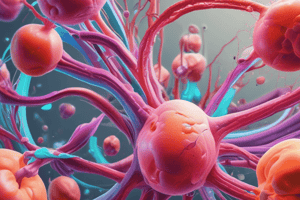Podcast
Questions and Answers
Which of the following conditions is NOT typically considered a primary contraindication for administering iodinated IV contrast?
Which of the following conditions is NOT typically considered a primary contraindication for administering iodinated IV contrast?
- Allergy to iodinated contrast
- Death Brain
- Creatinine level of 1.3 mg/dL with no acute kidney injury evidence (correct)
- Contrast-induced nephropathy
A patient with a known allergy to iodinated contrast requires a CT scan. What is the most appropriate next step?
A patient with a known allergy to iodinated contrast requires a CT scan. What is the most appropriate next step?
- Pre-medicate with antihistamines and corticosteroids and proceed with the CT scan using iodinated contrast.
- Proceed with the CT scan, ensuring emergency resuscitation equipment is readily available.
- Administer a reduced dose of iodinated contrast to minimize the allergic reaction.
- Choose an alternative imaging modality that does not require iodinated contrast. (correct)
Why is it important to assess renal function (e.g., creatinine level) before administering iodinated IV contrast?
Why is it important to assess renal function (e.g., creatinine level) before administering iodinated IV contrast?
- To reduce the likelihood of contrast-induced nephropathy. (correct)
- To avoid allergic reactions to the contrast agent.
- To minimize the risk of vascular rupture.
- To prevent hepatic failure.
Which of the following conditions listed is the LEAST likely to be directly related to the administration of iodinated IV contrast?
Which of the following conditions listed is the LEAST likely to be directly related to the administration of iodinated IV contrast?
A patient with a history of acute kidney injury requires a CT scan with contrast. Their current creatinine level is 1.6 mg/dL. What course of action is most appropriate?
A patient with a history of acute kidney injury requires a CT scan with contrast. Their current creatinine level is 1.6 mg/dL. What course of action is most appropriate?
A patient is undergoing a CT scan with iodinated contrast. Shortly after the injection, they develop hives and difficulty breathing. What is the most appropriate immediate action?
A patient is undergoing a CT scan with iodinated contrast. Shortly after the injection, they develop hives and difficulty breathing. What is the most appropriate immediate action?
What is the primary concern regarding the administration of iodinated contrast to a patient with hepatic failure?
What is the primary concern regarding the administration of iodinated contrast to a patient with hepatic failure?
Which of the following is the LEAST likely symptom of an allergic reaction to iodinated contrast?
Which of the following is the LEAST likely symptom of an allergic reaction to iodinated contrast?
A patient undergoing a CT scan with iodinated contrast experiences a vascular rupture. What is the most likely immediate complication?
A patient undergoing a CT scan with iodinated contrast experiences a vascular rupture. What is the most likely immediate complication?
What is the appropriate management strategy to prevent contrast-induced nephropathy in at-risk patients?
What is the appropriate management strategy to prevent contrast-induced nephropathy in at-risk patients?
Flashcards
Safe Creatinine Level for IV Contrast
Safe Creatinine Level for IV Contrast
Creatinine ≤ 1.5 mg/dl and no acute kidney injury.
Iodinated IV Contrast Contraindications
Iodinated IV Contrast Contraindications
Contrast-induced nephropathy or allergy to iodinated contrast.
General I.V. Contrast Contraindications
General I.V. Contrast Contraindications
Hepatic failure, brain death, allergic reaction, hemorrhage, vascular rupture.
Study Notes
- There are two main contraindications for the administration of iodinated IV contrast: contrast induced nephropathy and allergy to iodinated contrast.
- Current policy suggests a creatinine of less than or equal to 1.5 mg/dl and no evidence of acute kidney injury for IV contrast administration.
- Further contraindications include:
- Hepatic failure
- Death brain
- Any allergic reaction
- Hemorrhage
- Vascular rupture
Studying That Suits You
Use AI to generate personalized quizzes and flashcards to suit your learning preferences.




